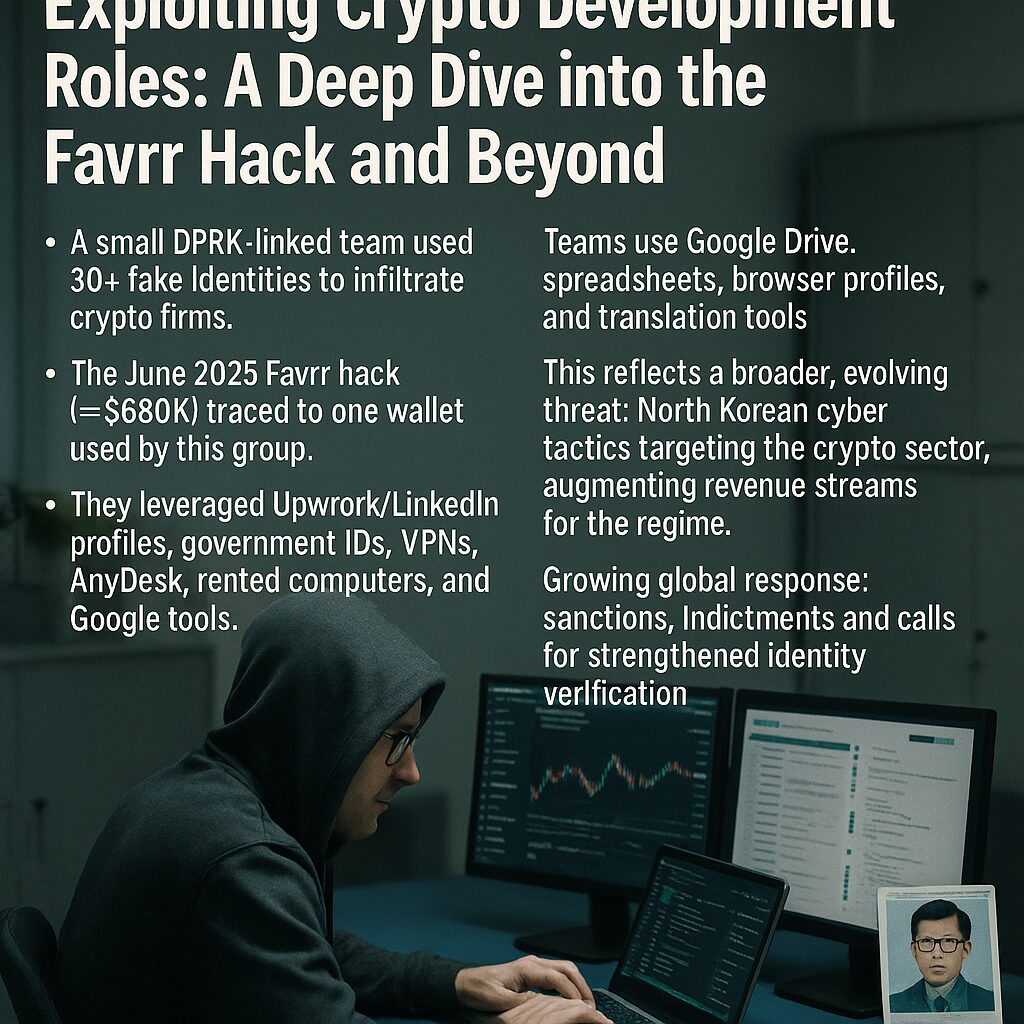
Main Points:
- A small DPRK-linked team used 30+ fake identities to infiltrate crypto firms.
- The June 2025 Favrr hack (≈ $680K) traced to one wallet used by this group.
- They leveraged Upwork/LinkedIn profiles, government IDs, VPNs, AnyDesk, rented computers, and Google tools.
- Teams use Google Drive, spreadsheets, browser profiles, and translation tools to coordinate.
- This reflects a broader, evolving threat: North Korean cyber tactics targeting the crypto sector, augmenting revenue streams for the regime.
- Growing global response: sanctions, indictments, and calls for strengthened identity verification.
1. Infiltration via Fabricated Identities
Blockchain sleuth ZachXBT uncovered that a team of five or six North Korean IT operatives successfully used over 30 fake identities to land blockchain developer and smart contract roles. They procured government-issued IDs, phone numbers, and even purchased Upwork and LinkedIn accounts to mask their true identities and gain access to crypto-related work opportunities.
One interview script discovered on a compromised device showed operatives claiming experience at Polygon Labs, OpenSea, and Chainlink, demonstrating how they constructed elaborate false resumes.
2. Tools of the Trade & Operational Workflow
The group used a consistent toolkit:
- Google Drive and Chrome profiles to manage schedules, budgets, and tasks.
- Google Translate to bridge language gaps between Korean and English.
- AnyDesk (or similar remote access software), VPNs and even rented computers to carry out assignments while obscuring their real locations.
Expense logs from May revealed they splurged around $1,489.80 on these tools—covering VPNs, AI subscriptions, proxies, and fake identity infrastructure.
3. Crypto Theft: The Favrr Hack Connection
ZachXBT linked one of the team’s wallet addresses, labeled “0x78e1a,” directly to the $680,000 hack of the fan-token marketplace Favrr in June 2025.
This suggests these operatives didn’t just infiltrate via developer roles—they also orchestrated or contributed to actual fund thefts, merging identity fraud with financial exploitation.
4. Broader Context: Evolving DPRK Cyber Strategies
This operation is part of a wider and increasingly sophisticated North Korean cybercrime ecosystem:
- The North Korean remote worker scheme has existed globally since about 2014, staffing thousands of operatives who conceal their identities to generate revenue—often funding weapons programs.
- Recently, cybersecurity firm DTEX exposed personas like “Naoki Murano” and “Jenson Collins,” linked to a $6 million crypto theft at DeltaPrime, with over 1,000 email addresses tied to DPRK operatives made public.
- The U.S. Department of Justice indicted 14 North Koreans in late 2024 for funneling at least $88 million via remote worker schemes over six years.
- North Koreans also set up shell U.S. companies (such as Blocknovas LLC and Softglide LLC) to target crypto developers with malware campaigns—linked to the Lazarus Group under North Korea’s Reconnaissance General Bureau.
- The infamous Lazarus Group continues massive crypto theft operations, including record-breaking hacks like the $1.46 billion Bybit incident and others in recent years.
5. Implications for Crypto Firms & the Blockchain Industry
- Identity Verification is Broken: The crypto sector’s trust in remote freelance platforms is being weaponized. KYC and HR checks are insufficient to detect state-sponsored deception.
- Remote Access = Remote Threat: Tools like AnyDesk and VPNs allow operators to breach systems under the guise of normal freelance work.
- Data & Funds at Risk: Beyond mere intrusion, operatives can convert infiltration into asset theft, code manipulation, or extortion.
- Trend Toward Hybrid Operations: Identity fraud is now a component of broader hacking campaigns, exploited by sophisticated, state-aligned actors.
6. What’s Next: Mitigation and Strategic Response
- Strengthen Vetting: Platforms should demand deeper identity validation—real-time verification, video interviews, and multi-factor onboarding for critical roles.
- Monitor Remote Tools: Security teams must log and audit remote access usage. Unusual VPN access or AnyDesk sessions should trigger alerts.
- Cross-Industry Cooperation: Crypto firms must share threat intelligence—wallet addresses, behavioral patterns—with law enforcement and peer firms.
- Regulatory Pressure: Standards for freelancer platform integrity are urgently needed to avoid becoming unwitting proxies in nation-state campaigns.
Final Summary
This case study reveals how a small North Korean IT team leveraged 30+ fake identities, tools like Google, Upwork, LinkedIn, VPNs, remote access software, and rented hardware to infiltrate crypto projects. Their operations culminated in the $680K Favrr hack and forms part of an escalating cybercrime wave tied to DPRK, blending remote job scams with blockchain theft and malware campaigns.
For crypto innovators and blockchain adopters, this is a warning: the very platforms meant to fuel innovation and global collaboration are being exploited by covert state actors. Proactive identity verification, remote activity monitoring, and cooperative defense are key to safeguarding the future of decentralized finance and digital asset ecosystems.

